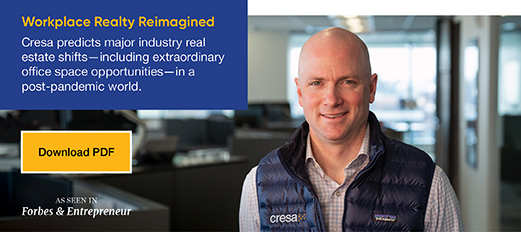Cresa Featured in Forbes and Entrepreneur: Workplace Realty Reimagined
From his vantage point as managing principal of the Boston office of Cresa, a commercial real estate advisory firm with 80 offices worldwide, Adam Subber has some pointed thoughts about the future of workplace environments. Throughout his decades with the company, he and his team have connected occupiers with the perfect spaces, negotiated the best terms, and offered consulting services including workplace planning and strategy. They’ve handled dispositions, lease-buyouts, and build-to-suit properties for virtually every corner of commerce. It is no surprise that Subber’s observations about where and how organizations do business cause people to lean in and listen—now, perhaps, more than ever.
“I’ve waited 20 years for office space to be front page news, but I never expected it to happen this way,” laughs Subber. He is referring, of course, to the profound impact the COVID-19 pandemic has had on the way people think about and interact with the workplace. “The past year has forced many companies and industries to look closely and strategically at how offices are used.”
In March of 2020, millions of people shifted to working from home almost overnight and found that, more often than not, their work could be performed successfully without leaving the house. “This will inform corporate decision-making regarding the use of offices for years to come,” Subber notes.
Embracing Challenge
When the COVID-19 pandemic hit, Cresa took stock and got busy. As a smaller, privately held firm, the company was nimble enough to quickly find new and necessary ways to deliver service and advise clients throughout 2020, helping them adapt to remote work and the potential for a more agile workplace in the future. “For those maintaining an active workplace, we provided up-to-date regulatory information to maintain a safe work environment,” Subber notes. “Above all, we are problem solvers; we think beyond space. We partner with our clients to help them navigate their real estate and workplace needs.”
Does the rise of work-from-home mean the end of offices? Not at all, says Subber.
“Our work has been bolstered by great clients in life sciences, consumer goods, manufacturing, and logistics that have done nothing but grow during the pandemic.” Other companies are opting to provide flexibility for the workforce never seen previously. “There is no substitute for in-person collaboration and gathering for meetings and pitches,” he adds, “but do employees need to be in the office every day? Some are rethinking that.”
On the flip side, the dissolution of many companies—and the widespread corporate evaluation of multi-node and suburban alternatives to major urban centers—is yielding unprecedented opportunities for startups and growing companies looking to set up shop in those areas. “It is clear that on the other side of COVID-19, there is going to be a reduction in the aggregate demand for office space in the top 50 markets in the country,” says Subber. “This translates into the potential for great options and values for occupiers ready to put their footprint down into spaces that a year ago were difficult for many companies to secure or afford. Working with Cresa advisors, clients discover a marketplace that is competing for their business.”
